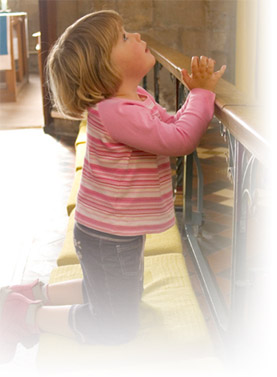Sunday Sermon for July 17, 2011, the Sixteenth Sunday in Ordinary Time, Year A
Readings: Wis 12:13, 16-19; Rom 8:26-27; Mt 13:24-43
In the Gospel reading today Jesus tells three parables regarding the Kingdom of God: a man who sows seeds in his field, the mustard seed and the woman who mixed yeast into the batch of dough. In each of these we understand that the Kingdom of God is something hidden, planted or buried deep within us. At the same time we also understand that it must grow and develop within us in order to bear fruit. Still further, like the yeast in the dough, the Kingdom of God within us will affect everything in us. In other words, it is not growing apart from us, but as God’s Kingdom within us expands, we expand with it.
Last week we heard the parable of the seed that was sown on the four different types of soil. Today we hear about the fact that the devil also plants weeds into the same soil as our Lord plants His Kingdom. Our Lord makes clear that the field is the world and that the seeds are the children of the Kingdom and the children of evil one. This is easy to understand on the objective lever, but it could also allow us to stand in judgment of those we regard as wheat or weeds. However, on the subjective level, if we are made from the earth and we are the soil into which the seed is planted, then we can also recognize that the vile creature has implanted some of his foul seed in us as well.
We may not like to look at things this way, but when we consider especially the parable of the yeast in the dough, it is pretty difficult to suggest that the dough is the world and not individual persons. Besides that, we all know that along with the good qualities, perhaps even saintly qualities, in us, there are also many sins and vices that have to be uprooted.
If we allow the vices to grow, they will choke off the growth of the good seeds. On the other hand, if we allow the Kingdom of God to grow within us, it will choke off the growth of the devil’s seeds. Thankfully, if the Kingdom of God has not been perfected in us by the time we die, it is clear from the parable that the weeds and the wheat will both be allowed to grow and that the weeds will be uprooted, bundled and thrown into the fire. This is what happens in Purgatory for those who died in the State of Grace, but had yet achieved perfection.
Having the Kingdom of God within us is an enormous privilege. It is not something we deserve, it is not something we earned though our own efforts; rather, it is a pure gift from God. Its growth is also a gift from God, but it requires our cooperation. St. Paul talks about how he planted the seeds into the Corinthians, Apollos watered it, but God provided the growth. There was human cooperation with God’s grace. Neither Paul, Apollos, nor the people in Corinth could take the credit for the growth.
In fact, in the second reading we are given the answer to the question of how the growth actually takes place. St. Paul says that the Spirit of God comes to our aid in our weakness and that He intercedes for us with inexpressible groanings according to the will of God. So we have been given the Gift of the Spirit, planted within our hearts like yeast, to affect our whole person and bring about true holiness. Our task is to cooperate with the inspiration of the Holy Spirit so that the Kingdom of God can grow within us.
God the Father has given us the gifts of His Son and the Holy Spirit; seeing the greatness of these gifts, St. Paul can ask if God would withhold anything. Obviously, if God will give the greatest gifts, He will also give the lesser gifts as well. However, the greatest gifts are Persons, not things. Therefore, they can be given even when we are enemies of God because they choose to come into the world and to love us. However, the other gifts that we seek are not persons and, therefore, requires a free choice on our parts to open our hearts in order to receive God’s gifts. This is why our Lord tells us to seek first the Kingdom of God and His way of righteousness and everything else will be provided.
We cannot be presumptuous or arrogant with God, as we see in the first reading, but we can trust in the mercy of God. His mercy is best understood by those who cooperate with the Holy Sprit and allow the Kingdom of God to grow within them.
Fr. Altier’s column appears regularly in The Wanderer, a national Catholic weekly published in St. Paul, Minn. For information about subscribing to The Wanderer, please visit www.thewandererpress.com.

